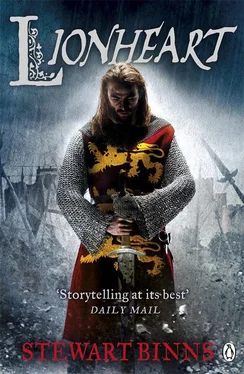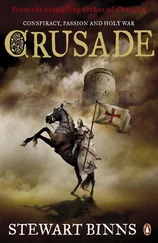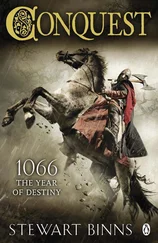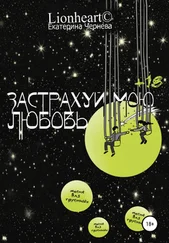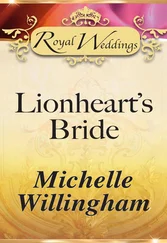It took me many minutes in the dank early morning, in that remote place in Ireland, to regain my composure. I became a warrior that day, and also a man. I discovered what I could do and realized the price that I would always have to pay.
With the return of daylight, I was soon able to find my horse and my men. By midday I had rejoined FitzGerald’s army, where I was treated as a hero.
In hindsight, our actions had been vicious and cruel, but at the time the morality of our actions was not a consideration. Our training as soldiers had become paramount and we had done what we were required to do. The result was that over a thousand of our enemy were either killed or captured. Strongbow returned with a larger army a year later, and King Henry arrived at Waterford with a large fleet shortly afterwards – the first English king to set foot in Ireland. The Irish kings submitted to him in Dublin; the English lordship of Ireland had begun.
I was rewarded for my part in the initial victory at Waterford with my knight’s pennon and a personal tribute from the King.
So, I had done my share of fighting and had killed a few wretched souls in battle. But unlike some of my comrades, it was not an activity that I approached mindlessly. It seemed to me that war was a part of our lives and that soldiers had to fight to keep their kingdom safe and maintain its discipline. Thus it was a means to an end, not an end in itself. Nevertheless, as I had chosen the life of a warrior, I had to excel in my profession in order to survive, and that is what I had always striven to do.
Then, when the direction of my life seemed set and my future predictably clear, came my intriguing summons to Winchester. Did it offer the opportunity for new adventures? I hoped so. I knew I was one of the most highly regarded of the King’s men; my status as commander of a conroi of cavalry attested to that, as did my elevation as a knight. Had I been chosen for a special mission, or just as a mundane messenger for a matter of trivia in the royal household? I feared it would be the latter – except that the old man before me did not appear to be the kind of individual to engage in court trivia.
There had been little prospect of adventure when I was a boy. My father was the local priest of a small community called Heysham on the northern coast, close to Lancaster. His church was an Old Saxon chapel – one of the few built in stone in the entire area – which looked out to sea from atop a rocky headland. He was very proud of his parish and its long history stretching back to the early days of our Christian faith.
He told me that we had Norse blood on both sides of his family and made sure that I was fluent in the Danish languages spoken in the hills to the north and east and across the Western Sea, in Ireland. My mother came from the lands beyond the Great Sands to the north, from a place called Keswick, in the Cumbrian hills, and she was equally proud of her Celtic roots. Hers was a mixed community of Celts and Anglo-Danes, but she was unequivocally a Celt. Her native language was very different from English and Danish; like my father, she made sure that I was fluent in it.
The rule in the house was simple: when we were together, we spoke English; when I was alone with my father, we spoke Danish; and when I was with my mother, it was always Celtic. It was a good grounding in languages, which my father embellished by giving me a strong grasp of Latin and, of course, fluency with the guttural tones of our Norman lords. Latin was difficult, but Norman was less so because, as my father often pointed out, it was based on the language of the Normans’ Viking ancestors, who hailed from the same lands as my Danish forefathers.
We saw Normans only rarely. Twice a year our lord, Henry de Lacy, Lord of Bowland and Baron of Pontefract, would send his steward to collect our taxes. The de Lacys were to be treated with caution. Their domain extended across the entire north-west of the country and as far east as the great keep at Pontefract. Three of the de Lacys had fought with the Conqueror at Senlac Ridge, and the present family had lost none of its forebears’ renowned ferocity. There was a large garrison of their men at Lancaster, whose main job was to patrol the old road to the north, all the way to Carlisle. The family also kept a small force at Preston and another one at Clitheroe.
Over the years, as my father and I made our monthly visits to the burgh of Lancaster so that he could attend meetings of the local clergy, I had watched the many foreign masons build the new stone castle at Lancaster. Slowly, but relentlessly, it loomed over us like the monstrous edifice of giants, built to remind everyone that what had happened to our land in the distant past – and the result of those events – was an everlasting reality.
My father had told me many times about the devastation of the north by the Conqueror, as he punished the local populace for their rebellion of 1069. Tens of thousands were killed and the farms laid waste. For three generations the lands north of Chester and the Humber were abandoned, the fields becoming a wilderness. Only within my lifetime were people rebuilding the villages and ploughing the ground again. Lancaster was one of the many places that were beginning to flourish in the uneasy truce between Norman and Englishman.
Almost no one believed that the Normans would ever relinquish control of our lives, but that did not prevent us from cherishing our English language and folk memories. As a boy, I had feared our Norman masters and thought of them as a different breed. But after several years of serving with them and for them, I had come to realize that they were not very different from us at all.
Most importantly, we English knew that our King, the formidable Henry Plantagenet, although a Norman in words and deeds, also carried enough English blood to make him as much ‘one of us’ as he was a Norman. His mother, the Empress Matilda, who had styled herself ‘Lady of the English’, was a direct descendant of the ancient Cerdician kings of England and Wessex, tracing her lineage all the way back to Alfred the Great. That simple fact of genealogy was so important to us; despite its daunting Norman facade, it made our blood a living part of the inheritance of our kingdom.
We also took great comfort in the fact that King Henry ruled an empire far bigger than either England or Normandy, making us all feel part of a mighty dominion of many peoples, languages and traditions, a vast realm of which we could all be proud. Not only that, but after several generations, our Norman rulers had come to adopt many of our customs and all could now speak English.There were so many of us, and so few of them, that they had no choice; our mother tongue had become the customary language, while the Normans kept to their own idiom among themselves and at court. Even so, Latin was always the language of government, both secular and spiritual.
My father knew that a good education afforded me one of the few routes to any kind of future. The Church, especially one of the great northern monasteries, was the objective he set for me. He worked tirelessly to make sure I had the intellectual gifts and personal discipline to succeed – so that when it came time for me to be subjected to the rigours of examination by the all-powerful abbot and his inquisitors, I would be ready.
Now, in the Great Hall at Wolvesey, I faced a similarly intimidating encounter.
‘I am Harold of Hereford, Earl of Huntingdon.’
When the dignified old man spoke to me, he reminded me of my father (especially when he used to mimic the austere tones of the Abbot of Rievaulx, an imposing man typical of his Norman kind). The Earl spoke in English, without any hint of a Norman accent, confirming my assumption that I was in the presence of a man of my own kin.
Читать дальше
